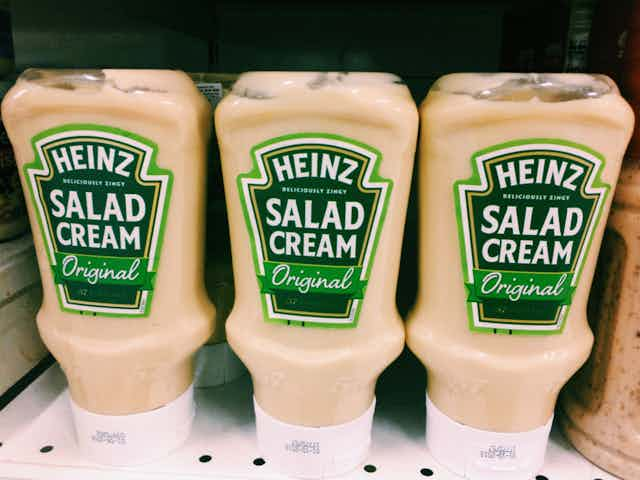The American food giant Heinz sparked controversy with a recent proposal to change the name of one of its best known products. If it goes ahead, there will be no more Salad Cream in the world’s kitchens. We will have to make do with bottles of Sandwich Cream instead.
The argument for doing this seems logical enough – apparently only 14% of buyers actually use it on salads. This makes sense to me as a consumer, as I’ve only ever used it to make cheese and salad cream sandwiches – a favourite picnic treat in the UK.
But does it really matter what it’s actually used for? After all, it’s been called Salad Cream for more than 100 years since its launch in 1914. Heinz obviously thinks so, though perhaps it didn’t anticipate the depth of feeling which this proposed renaming would provoke.
On social media there has been outrage, disbelief, and comparisons made with previous renaming events – like when Marathon bars became Snickers, and Opal fruits gave way to Starburst.
The depth of feeling surrounding the renaming of these products is interesting to me as an onomastician – someone who studies names. As fellow onomastician Carole Hough explains:
Names are interesting for what they tell us about ourselves and about the people who share or have shared the world with us. The choices we make in giving names to our children, our pets and our homes reflect the things that are important to us.
Names are a phenomenon of interest, hiding in plain sight. They are at the heart of how we communicate with each other, and one of the first things we focus on when learning a new language.
That’s not my name
In my own research, I’ve discussed how I am often unwittingly renamed by strangers, who assume the English pronunciation of “Sarah” (pronounced Serruh), rather than the Welsh (and globally more common) pronunciation of “Sara” (phonetically Sᴂᴂ) with two hard “A"s and a rolling "R”.
While I have personally found this irritating, others have written more harrowing accounts of being renamed by teachers who don’t understand how languages other than English are written, with some letters having accents. María S. Rivera Maulucci, of Columbia University explains:
My parents gave me the name, María, and when I learned to write, my mother taught me to put a slanted line, not a dot, over the letter, i, in my name. Yet in school, what was a source of ethnic pride was erased. I distinctly remember my kindergarten teacher screaming at me: “That is not how you write the letter, i!” She made me erase the accent mark and replace it with a dot. That was when I became Maria.
Meanwhile, during a TV debate ahead of the 2017 UK general election, UKIP’s Paul Nuttall annoyed Plaid Cymru leader Leanne Wood, by twice referring to her as “Natalie” in the space of 20 minutes. Speculation as to why Nuttall made this blunder ranged from confusing her with the actress Natalie Wood, and also the former Green Party Leader, Natalie Bennett. But many on social media saw it as evidence of a lack of respect towards women, in that he couldn’t tell them apart.
This was an interesting angle, since the general election ran parallel to the UK television broadcast of an adaptation of The Handmaid’s Tale. Margaret Atwood’s famous novel is the story of a dystopian, patriarchal future, where fertile women are enslaved as “handmaidens”, with every aspect of their former identities removed.
This includes their names, which are replaced by a patronymic made up of the name of their master and the word “of”, to indicate subjugation. The main character’s master is named Fred, so she becomes “Offred”.
A bridge too far
Another recent example of a controversial renaming proposal concerns the bridge in the UK which spans the River Severn – the Severn Bridge, or Pont Hafren, to give it its Welsh name.

This is an important distinction, because all names – whether for products, brands, bridges, or our own personal names – are words which reflect the cultures and languages from which they emanate.
As with all bridges, the Severn Bridge/Pont Hafren, has a foot on two banks. In this case, one in England and one in Wales. Objections to the renaming of the bridge therefore have a cultural and linguistic component, and are linked to the uneasy history between the constituent countries of the UK, particularly the oppression of the Welsh language.
The fact that the bridge will be renamed “The Prince of Wales Bridge” has further emotive connotations, due to the complex political tensions regarding the “British” royal family in Wales.
In response, more than 27,000 people have signed a petition against this new moniker. On the other side, newspaper columnist Rod Liddle reacted by directly attacking not only the Welsh people but also the Welsh language.
His comments were met with astonishment and disdain by the Welsh press and politicians, who pointed out the lack of accuracy of his throwaway comment that the Welsh language has no vowels. It has also been claimed that Liddle’s attack is tantamount to racism.
Then, following the sensational performance of Welsh footballer Gareth Bale’s at the Champions League final, a fresh petition was launched – calling for the Severn Bridge to be named after him instead.
As an onomastician, I will be following the Heinz salad cream debate with much interest. I am firmly in camp “remain”, as I have been on other recent issues, including the renaming of Pont Hafren.
But it is not the first time Salad Cream fans have been worried. There was an outcry in the 1999, when Heinz was reportedly considering calling a halt on production altogether. This generated so much publicity that Heinz relaunched Salad Cream the following year with a £10m advertising campaign. A similar end to this scandal would be a mouthwatering prospect for Heinz.
Read more: Why racism against Welsh people is still racism

